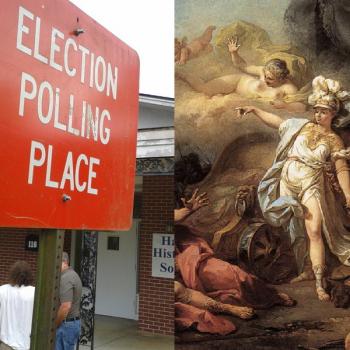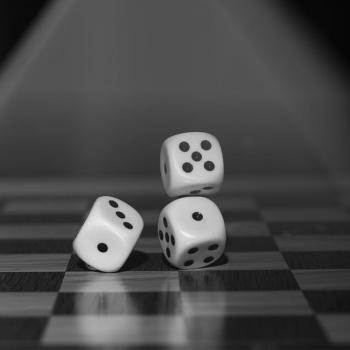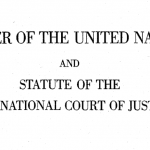In reply to a friend worried that Trump’s electoral victory opens the door to hate:
No one’s heart has changed since yesterday. Those who hated yesterday hate today. Those who loved yesterday love today, and will still take action to love and protect and care for others. Will it be a bit harder to use the federal government as a means to do that come January? Yeah, but the federal government was always a lousy tool for that job.

No matter your political leanings, I hope you voted yesterday (or before, where and how permitted by law). Yes, even if you pulled the lever for vile demagogue Donald Trump or vile war criminal Hillary Clinton, I’m glad you went. If you didn’t cast your ballot because you didn’t want to vote for any of the lousy candidates for President on your ballot, by not just skipping that race and voting on the rest you missed on on not just the opportunity to vote on downticket races but also to participate in direct democracy — real democracy — on bond issues and ballot questions. It’s not much but if we don’t preserve that seed of actual citizen rule by participating in the bit of it that we do have, it can never flourish. Give Athena her due, preserve and protect the embers of democracy.
Speaking of which, it’s become fashionable to bash democracy lately. Between Brexit and Trump, our elites are convinced that the ignorant masses are making the wrong decisions and perhaps the franchise needs to be limited. Roslyn Fuller has an excellent explanation of why the problem is too little, not too much, democracy:
The constant suppression of societal dissatisfaction, rather than dealing with people’s grievances as they arise is what creates the Trumps among us. Anger and frustration may be ugly things to deal with and they may manifest in forms we don’t approve of, but the willingness and ability to deal with them was what made Athenian democracy strong and resilient. The unwillingness to deal with these grievances, to dismiss them as illegitimate and seek to suppress their expression by marshalling forces to defeat them in election is what made Rome a brittle Republic. It was not too much democracy that made Romans willing to accept an enlightened despot in Caesar, but rather too little.
If the United States were a democracy, it would have no need for Black Lives Matter, because any citizen would be able to report police brutality to the Assembly at any point and have a judgment rendered immediately instead of suffering in silence. If the United States were a democracy, it would not run for-profit prisons, because companies would not be allowed to collude with a special group of lawmakers behind closed doors to get their predrafted laws passed. If the United States were a democracy, there would be no “money in politics” because there would be no one to spend the money on. If the United States were a democracy, it would be devoid of mass media demagoguery, because anyone would be entitled to address the public in a public sphere anytime they
wanted. I’ll even give the benefit of the doubt and say that if the United States were a democracy, it may not have perpetrated so many wars on other people.
Also worth a read as Athena comes under attack is C. L. R. James’s famous essay “Every Cook Can Govern”:
This is the greatest lesson of the Athenian democracy for us today. It was in the days when every citizen could and did govern equally with any other citizen, when in other words, equality was carried to its extreme, that the city produced the most varied, comprehensive and brilliant body of geniuses that the world has ever known.
(Though I disagree most strenuously with James that Marxism has anything to do with democracy, but that’s a minor tangent in his argument here.)
For something non-political: stumbling across Raymond M. Smullyan’s essay Is God a Taoist? was one of the formative experiences of my life. Smullyan also introduced me to the idea that the mystical sense is in some ways parallel to the sense of humor. I just discovered his “Planet Without Laughter”, an story/essay which uses this parallelism to explore the relationship between science, religion, and mysticism. (And that copy is hosted on the homepage of Donald E. Knuth, of The Art of Computer Programming Fame!)
This phrase “see Humor directly” was particularly apt to be criticized. The Mystic-Humorists actually said: “Yes, we can see humor in many situations. Life is permeated with humor, if you can only see it.” The skeptical Anti-Humorists said, “So, you claim you can see humor! Tell me, what color is it?” The Mystic-Humorists laughed and said, “Humor doesn’t have any color!” The skeptics continued: “Oh, so you can see it only in black and white! Well, then, what shape is it?” “It doesn’t have any form or shape.” “Then I am confused! Is humor visible or invisible?” “Of course it is invisible!” “But I thought you just said that you can see it. Didn’t you say that you could see the humor of certain situations?” “Well, yes, I said that, but I didn’t mean `see’ in the literal sense of `see with your eyes.’ Ocular vision really has nothing to do with it. I used `see’ in the sense of directly perceive, not see with the eyes. The perception, though as direct as vision, is really through a different sense altogether:” “A different sense? Which sense is it—hearing? If so, what does humor sound like? Or is it smell or taste or touch or what? With which of the five senses do you perceive humor, or is it a combination of more than one of them?” “No, it is not any one of these five senses, nor is it a combination of them. It is a different sense altogether—in a way, it is a nonphysical sense—we call this sense the `sense of humor’.” “Good God, you literally mean a nonphysical sense? In other words, you mean it is something occult like telepathy or clairvoyance? But scientific integrity requires us not to believe in anything occult; hence we cannot but believe that this Humor is something totally unreal, a mere figment of the imagination.”

















